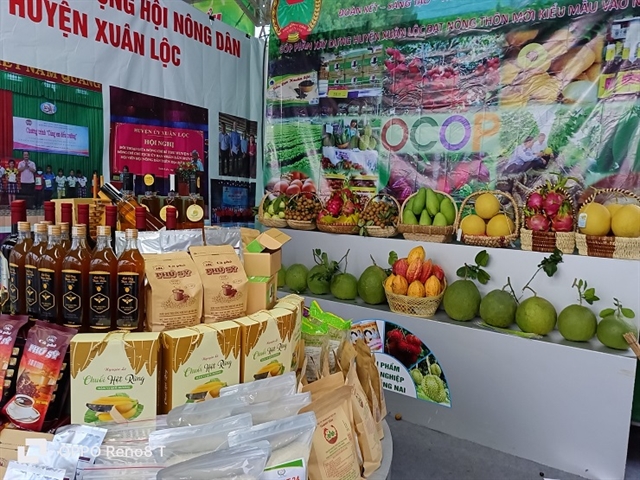 Society
Society

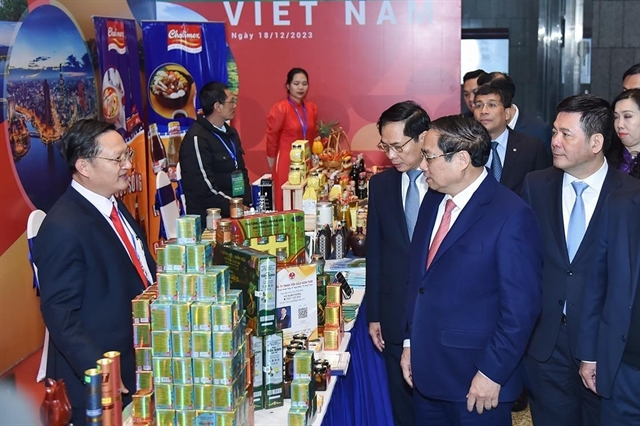 |
| Prime Minister Phạm Minh Chính (2nd right) visits a booth of Kon Tum Salanganes Nest Co Ltd during an economic diplomacy event last December. — Photo courtesy of the company |
By Mai Hương
Việt Nam's national 'One Commune, One Product' (OCOP) programme, active until next year, is crucial for rural economic development, transitioning from small-scale to value chain-linked production.
Goods under the OCOP banner are tied to a specific geographical origin, with a certain reputation for being unique and of excellent quality. The programme utilises internal resources, such as wisdom, creativity, human resources, raw materials and local culture, increasing product value and employment, and raising rural incomes.
However, for international expansion, OCOP items need systematic elevation. Strengthening the value chain is essential for them to penetrate global markets, yielding high profits for farmers/workers and promoting sustainable rural economic growth.
The latest data of the Ministry of Agriculture and Rural Development (MARD) showed, all 63 provinces and cities nationwide had classified over 13,300 OCOP items, exceeded the target of 10,000 products for 2021-2025. Of these, 74 per cent achieved three-star status, 25 per cent achieved four-star status and 0.3 per cent were rated five stars, with others being potential 5-star products.
The programme has attracted over 7,400 participants, including cooperatives, enterprises and production facilities.
Phùng Đức Tiến, deputy minister of MARD, noted that OCOP items had shifted the mindset from agricultural production to agricultural business, linking agricultural development with local economic, service and tourism growth.
Experts observe that after six years, the programme has led to an increase in the number of products, with greater diversity in types, designs and styles. These products now boast improved quality, environmental friendliness and clear origins, building consumer trust and facilitating regulatory monitoring.
OCOP items are gaining influence and attracting strong consumer demand, prompting their inclusion in many large enterprises and supermarkets' distribution systems. High-quality OCOP items like Tài Hoan vermicelli (from Bắc Kạn Province), Bích Thao coffee (Sơn La Province) and ST24 rice (Sóc Trăng Province) have been exported abroad.
Challenges in going abroad
Despite efforts to maximise product potential and elevate the Vietnamese brand globally, OCOP items still face challenges in market expansion, particularly in terms of exports. Participation in modern retail chains and major markets like Europe, the US, Japan and South Korea remains limited.
Experts note that localities need to better support raw material development and traceability to meet market demands. Elevating a product from 3- to a 4-star status, which is necessary for export, requires meeting standards in trade promotion, geographical indications, value chain linkage, market access and product origin. These requirements are challenging for small-scale producers. Achieving five stars is even more difficult, requiring regular export markets beyond existing standards.
Đặng Xuân Hùng, director of Kon Tum Salanganes Nest, explained that achieving higher star ratings involved meeting increasingly strict standards. A 5-star rating would require approval from MARD, whereas a 4-star rating could be granted by provincial authorities.
Despite the stringent criteria, attaining a star rating boosts consumer confidence. OCOP producers receive support from various ministries and departments, including promotional assistance at domestic and overseas fairs and exhibitions and prioritised sales on e-commerce platforms.
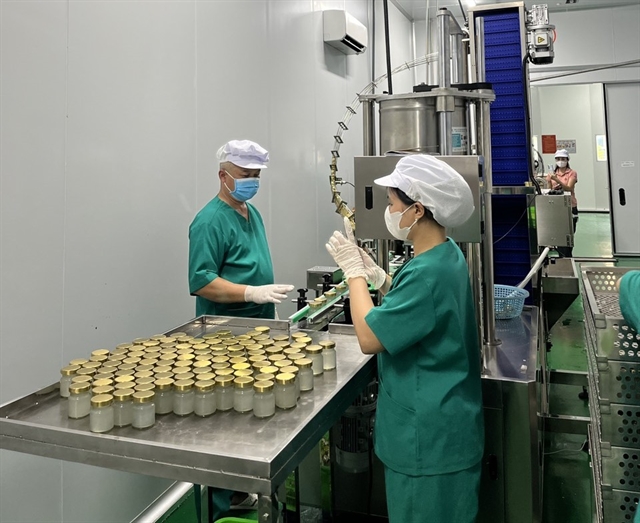 |
| An edible bird's nest production line in the Kon Tum Salanganes Nest's factory in Kon Tum Province. — Photo courtesy of the company |
Founded in 2017 from a family business in Kon Tum Province in the Central Highlands, Kon Tum Salanganes Nest has been building its brand since 2020. Hùng emphasised that maintaining high quality in raw materials, production, and processing was essential for brand building and improving the product's star rating.
Since mid-year, the company had exported its products to China. Although the quantity was small, feedback from Chinese customers had been positive.
"Chinese enterprises are meticulous, thoroughly inspecting factories, water sources, production processes, machinery, and evaluating samples in China before approving exports," Hùng told Việt Nam News.
According to Hùng sustainable exports require securing a certified raw material area and establishing a compliant factory, technology and production process. There is a lack of economic policies designated to support OCOP production, with current support limited to product promotion rather than providing loan policies.
"I started business by borrowing money from relatives and friends. Presently, the company relies on collateral to secure loans. Many OCOP businesses don’t need preferential loans but desire long-term loan policies for secure stable production," Hùng said.
In Nghệ An Province, Đức Phong Co Ltd's hanging bamboo lantern is Nghệ An's first 5-star national OCOP item, exported to 34 countries. The company is expecting to add two more 5-star products this year: gift boxes and bamboo table lamps, blending traditional and modern elements.
"Obtaining the sustainable forest management certificate brings many benefits to the community, increases the value of wood and enhances income per unit area," Thái Đại Phong, director of the company, said.
However, he said, the certification process still faced numerous challenges, and the progress was slow, not matching the potential, causing difficulties for export-oriented enterprises like his company.
Phong also pointed out that local authorities had not paid sufficient attention to supporting the development of raw material areas and ensuring traceability, which is crucial for meeting market demands in terms of quantity and quality.
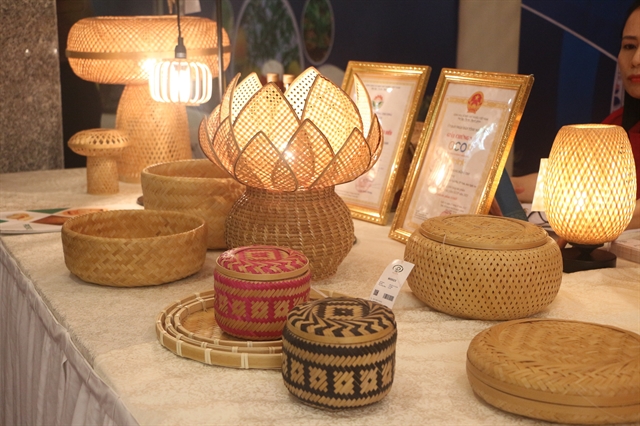 |
| Nghệ An Province-based Đức Phong Co Ltd's bamboo lanterns. The company's products are exported to 34 countries. — VNA/VNS Photo Bích Huệ |
Enhanced support
Nguyễn Minh Tiến, director of the Agricultural Trade Promotion Centre (Agrotrade), said that beyond enhancing domestic consumption, Agrotrade was assisting OCOP businesses in exporting their products.
Products rated 4 stars or higher, meeting export standards, were promoted at international fairs by the centre. This year, select OCOP items would be showcased at two fairs in Dubai and Japan, Tiến told Việt Nam News.
Last year, a pilot introduced an OCOP booth at a craft fair in Milan, Italy, featuring standout Vietnamese products like woodwork, sculptures, horn products and silk, which captivated Italian customers. Later this year, some Hà Nội-based silk businesses would also participate in this event in Milan.
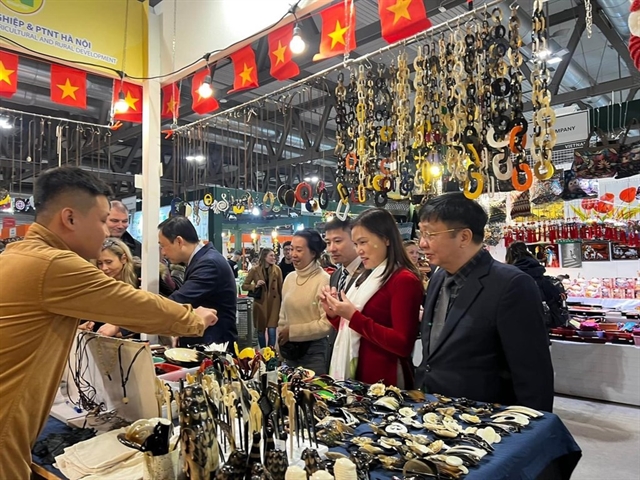 |
| Leaders of the Hà Nội Department of Agriculture and Rural Development visited the Hà Nội booth at a craft fair in Milan, Italy last December. — VNA/VNS Photo Phương |
He also emphasised the success of OCOP items in international markets. Glass noodles and dried rice from Thái Nguyên and Bắc Giang provinces had established markets in the EU and Australia, and Lê Gia shrimp paste had been exported to Japan.
This year, following MARD’s directive, Agrotrade would choose exemplary OCOP items to promote on e-commerce platforms such as TikTok, expanding to global platforms with a specific focus on ASEAN and China (utilising platforms like Douyin and Taobao in China).
"However, challenges persist," Tiến said, noting only a limited number of items meet export conditions, particularly food products due to stringent requirements in export markets.
"OCOP producers are primarily cooperatives and small enterprises. Beyond technical barriers, the cost of export compliance assessment can reach several hundred million đồng, a significant expense for OCOP units."
Currently, Agrotrade supported businesses with procedural guidance, customs connections and foreign enterprise linkages, he said. It also assisted OCOP producers with improving product design, packaging and labelling, providing market research insights to tailor products to user preferences.
"OCOP items hold economic value and serve as ambassadors of Việt Nam’s agriculture and culture," he said.
Efforts from provinces
Provincial governments are actively supporting OCOP production by organising events to promote them nationwide and assisting in brand building and e-commerce channel development.
In major cities like HCM City, the programme has expanded geographically and in scope since 2022. It has been implemented citywide instead of being limited to five suburban districts as in the initial phase.
The programme now evaluates and classifies OCOP items across six sectors: food and beverages, medicinal herbs, textiles and apparel, souvenirs, interior decorations and community-based tourism services. This expansion has attracted a diverse range of participants, including businesses, cooperatives, collaborative groups, farms, and households.
To date, HCM City has recognised 191 OCOP items from 67 entities, including 79 products rated 4 stars and 112 products rated 3 stars. One product is currently under consideration for 5-star certification.
Hà Nội, leading the nation in OCOP items, has classified 2,711 products since 2019, of which, there are six 5-star products, 1,473 four-star products and 1,220 three-star products. The capital city aims to have 2,000 more OCOP items certified with three stars or higher by 2025.
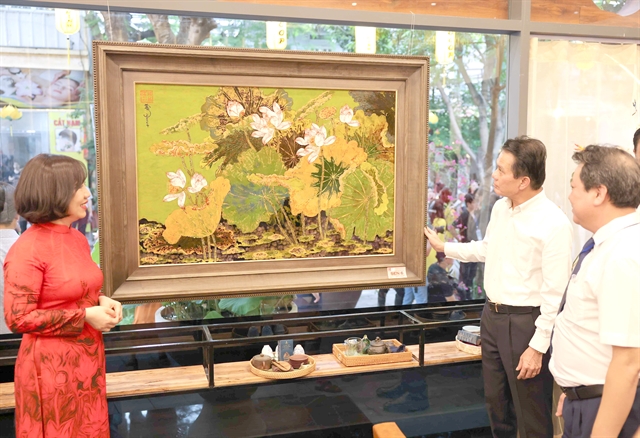 |
| Delegates visited the OCOP product information centre in Tây Hồ District, Hà Nội, which was inaugurated during the Hà Nội Lotus Festival on July 12. — VNA/VNS Photo Thanh Tùng |
Nghệ An, Tiền Giang and An Giang provinces have all significantly developed their OCOP programmes, with measures to identify and protect local products, enhancing producer credibility.
Efforts of cities and provinces nationwide aim to stimulate broader participation in the programme and facilitate the commercialisation of new products in the domestic and overseas markets, fostering economic growth and enhancing Việt Nam's agricultural and cultural heritage. — VNS




